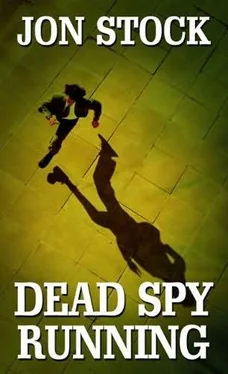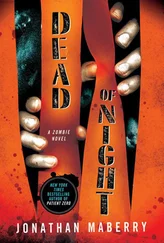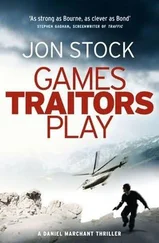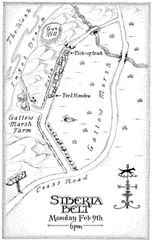Jon Stock - Dead Spy Running
Здесь есть возможность читать онлайн «Jon Stock - Dead Spy Running» — ознакомительный отрывок электронной книги совершенно бесплатно, а после прочтения отрывка купить полную версию. В некоторых случаях можно слушать аудио, скачать через торрент в формате fb2 и присутствует краткое содержание. Год выпуска: 2009, Издательство: St. Martin, Жанр: Триллер, на английском языке. Описание произведения, (предисловие) а так же отзывы посетителей доступны на портале библиотеки ЛибКат.
- Название:Dead Spy Running
- Автор:
- Издательство:St. Martin
- Жанр:
- Год:2009
- ISBN:нет данных
- Рейтинг книги:3 / 5. Голосов: 1
-
Избранное:Добавить в избранное
- Отзывы:
-
Ваша оценка:
- 60
- 1
- 2
- 3
- 4
- 5
Dead Spy Running: краткое содержание, описание и аннотация
Предлагаем к чтению аннотацию, описание, краткое содержание или предисловие (зависит от того, что написал сам автор книги «Dead Spy Running»). Если вы не нашли необходимую информацию о книге — напишите в комментариях, мы постараемся отыскать её.
Dead Spy Running — читать онлайн ознакомительный отрывок
Ниже представлен текст книги, разбитый по страницам. Система сохранения места последней прочитанной страницы, позволяет с удобством читать онлайн бесплатно книгу «Dead Spy Running», без необходимости каждый раз заново искать на чём Вы остановились. Поставьте закладку, и сможете в любой момент перейти на страницу, на которой закончили чтение.
Интервал:
Закладка:
15
For a moment, Marchant wasn’t sure if the explosion was part of the interrogation. His face had just been wrapped in clingfilm, so tightly that it had flattened his nose to one side, when he felt a loud blast to the left of him, followed by shouting in Polish. He couldn’t see anything, because he was wearing the blackened goggles again, but he could hear the Americans choking. Moments later he was being unstrapped from the table, his shackles removed with bolt cutters, and the goggles and clingfilm removed.
He counted six men in the room, wearing gasmasks and army uniforms, all of them with semi-automatic weapons. One of them strapped a mask onto Marchant just as he was starting to taste the rancid tang of teargas, while another checked the two Americans for vital signs. Then he was bundled out of the room and into the back of a waiting black van.
‘Hugo Prentice,’ said a weatherbeaten man sitting opposite him. ‘Warsaw station. Worked with your father in Delhi. Fielding sends his love, apologises for the slap and tickle.’
Fielding glanced at his watch, added an hour for Poland, and wondered how long it would be before Spiro was on the phone. Give him half an hour, he thought, looking at the files spread across his desk. HR had printed out the most recent employment profiles of Leila, Daniel and Stephen Marchant, and he had also requested the South Asia Controllerate’s dossier on Salim Dhar. He glanced down the opening page, marked ‘Confidential, For UK Eyes Only’, and thought, not for the first time, that he was missing something, a piece of information that linked Dhar with his predecessor as head of MI6. What was it that had made Stephen Marchant fly five thousand miles to visit him in Southern India?
Dhar, according to the file, had been born Jaishankar Menon, to a middle-class Hindu couple in Delhi on 12 November 1980. His father worked at the British High Commission as an administrative officer. Shortly before Dhar was born his contract was terminated, but he soon picked up a similar job at the US Embassy. Dhar later attended the American School in Delhi — someone had handwritten ‘employment perk?’ in the file, below another mark that said ‘bullied?’ — but left at sixteen.
The next time Dhar showed up, two years later, he was in Kashmir, where the police arrested him for trying to blow up an army base. His charge sheet listed him as ‘Salim Dhar’. Somewhere between Bangalore and Srinigar, he had converted to Islam and become radicalised, focusing his hatred of the West on America.
At this point, RAW, India’s Research and Analysis Wing, had stepped in and tried briefly to recruit him, sensing an opportunity to play him back into the Kashmiri separatist movement. But Dhar was having none of it. In another report, sent over from RAW as part of Bancroft’s investigation into Stephen Marchant, it was concluded that Salim Dhar was ‘utterly unpersuadable’ and ‘totally unsuitable’ for recruitment. His commitment to the establishment of an Islamic caliphate, starting with the reunification of Kashmir and culminating in the destruction of America, was absolute. A year later, he escaped from jail and went to ground in Pakistan, later resurfacing in Afghanistan.
There was only one thing that caught Fielding’s eye: in the psychological profile of Dhar, attention had been drawn to the poor relationship he had with his father, who unlike his son loved all things American, and hoped one day to emigrate to New York. It was cited as a possible reason Dhar had left school, and Delhi. If Stephen Marchant had tried to recruit Dhar, for whatever reason, had he held some information on Dhar’s father? It was the one possible point of leverage Fielding could find in the file. Salim Dhar appeared to have led a clean life, his only points of conflict inspired by ideology rather than anything more basic. No women, drinking, stealing, corruption — nothing to blackmail him with.
In Fielding’s mind, Stephen Marchant’s tenure in Delhi had been in the late 1970s, while Jimmy Carter had been in the White House. It was there, in the aftermath of ‘Smiling Buddha’, India’s first nuclear test, that Marchant had made a name for himself. Few people in the Service hadn’t heard of him. Partly that was because of his audacious recruitment of a senior player at the Russian Embassy in Delhi, who rose to great heights within the KGB when he returned to Dzerzhinsky Square, but also because of the family tragedy that had engulfed him.
Fielding reopened Marchant’s file and looked through his postings. As he suspected, Marchant had arrived in India in August 1977, as a case officer, moving back to Britain in July 1980 for the birth of his twins (his wife had endured a difficult pregnancy and spent much of it in London, avoiding Delhi’s oppressive heat). But Marchant had returned to India five years later, this time as station head and with his young family in tow. Then, in 1988, disaster had struck when Sebastian was killed in a car accident.
Fielding recalled it all more clearly now. Everyone in the Service had felt wretched about Marchant’s loss, the subsequent deterioration in his wife’s mental health, and his stoic refusal to leave Delhi until his tour of duty was over.
Fielding turned to Dhar’s early life again, checking the dates of his father’s employment at the British High Commission in Delhi. He had started in January 1980, which meant that Marchant and Dhar’s father had overlapped for six months. Delhi was a big mission, second only to the British Embassy in Washington, but there was a chance the two might have come into contact with each other. It wasn’t much to go on, but Fielding knew it was something. He picked up the phone and asked for Ian Denton.
16
After a bone-breaking, hundred-mile drive through the Polish countryside, Marchant found himself in the bar of the brand new British Embassy in Warsaw with a glass of Tyskie beer in his hand. He had been unable to speak for most of the journey, retching from the water still in his system and the potholed roads, drifting in and out of sleep. But he did register Prentice explaining that his interrogation had taken place at Stare Kiejkuty, a former outpost of the SS’s intelligence wing during the Second World War.
Fifteen minutes from Szymany airport, the site had subsequently been used by the Soviet Army, when Brezhnev was planning to crush the Prague Spring. More recently it had been occupied by a secret division of the Wojskowe Słužby Informacyjne, Poland’s military intelligence service, who were more than happy to oblige the CIA’s request for a secure facility in which to interrogate their High Value Detainees — in return for cash, of course. It was a canny, if ironic, choice by the Americans, Prentice had explained. The WSI wasn’t subject to the same levels of public scrutiny as civilian agencies such as the new Agencja Wywiadu, and its officials, many of whom were survivors from the old communist era, could claim protection under NATO because of their military status.
‘You’re in good company — Stare Kiejkuty boasts some fine alumni,’ Prentice had added. ‘It’s where they dunked KSM in 2003.’
The dank cell where Marchant had been waterboarded couldn’t have been more different from the airy, glass and steel edifice he now found himself in. He knew that the sleek new building was a blueprint for British embassies of the future. Delayed and redesigned after the bombing of the consulate in Istanbul, it remained accessible to the public but was now built to withstand a major terrorist attack. It also incorporated a security feature required of all new Foreign Office buildings. In the event of a physical assault, an ‘onion’ layering of doors and walls protecting an inner sanctum that should take at least forty minutes to penetrate would allow sensitive documents to be shredded and hard drives wiped.
Читать дальшеИнтервал:
Закладка:
Похожие книги на «Dead Spy Running»
Представляем Вашему вниманию похожие книги на «Dead Spy Running» списком для выбора. Мы отобрали схожую по названию и смыслу литературу в надежде предоставить читателям больше вариантов отыскать новые, интересные, ещё непрочитанные произведения.
Обсуждение, отзывы о книге «Dead Spy Running» и просто собственные мнения читателей. Оставьте ваши комментарии, напишите, что Вы думаете о произведении, его смысле или главных героях. Укажите что конкретно понравилось, а что нет, и почему Вы так считаете.












